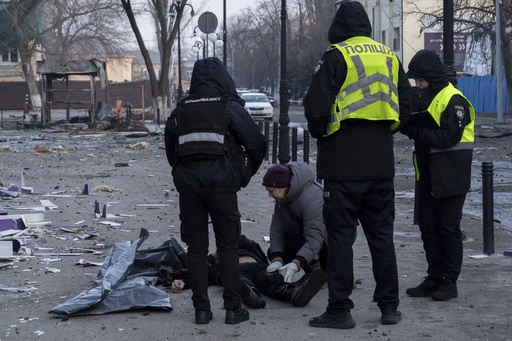
Kyiv, Ukraine — A scheduled press conference following discussions between Ukrainian President Volodymyr Zelenskyy and U.S. envoy Keith Kellogg was abruptly canceled, intensifying the already strained political dynamics between Ukraine and the United States regarding the ongoing conflict with Russia.
Initially, the event was intended for Zelenskyy and Kellogg to address the media, but it was unexpectedly transformed into merely a photo opportunity. Photographers captured the two shaking hands and sitting across from each other, yet no formal statements or inquiries were entertained. Ukrainian presidential spokesman Serhii Nikiforov attributed the last-minute alteration to a request from the U.S. side.
Kellogg’s visit to Kyiv coincided with increasing tensions between President Trump and Zelenskyy, raising uncertainties about the future of American support for Ukraine amidst the war. Journalists gathered, expecting a conference, but were informed instead that no remarks or questions would take place, aligning with the wishes of the U.S. delegation.
The focus of the discussions was meant to be on the efforts to conclude the nearly three-year-long war. Zelenskyy expressed anticipation for sharing an update on the situation in Ukraine; Kellogg, a key figure in Trump’s defense strategy, was expected to collaborate on future steps.
Zelenskyy described his conversation with Kellogg as substantive and informative, addressing topics such as security guarantees for Ukraine and the repatriation of Ukrainian prisoners from Russian captivity. He stated the urgency for a strong and beneficial agreement with the U.S. regarding security and investments, aiming for lasting peace to prevent any future aggression from Russia.
Recent exchanges between Zelenskyy and Trump have added to the tensions. Following a joint commitment from Russia and the U.S. to pursue an end to the war, Trump reversed a longstanding policy of isolating Russia. Zelenskyy expressed dissatisfaction that U.S. representatives initiated discussions without involving him or European allies who have supported Kyiv.
In response to Trump’s comments about his popularity in Ukraine, Zelenskyy suggested that Trump had fallen prey to disinformation spread by Russia. In return, Trump accused Zelenskyy of authoritarian behavior and implied that Ukraine bore responsibility for the conflict, as the ongoing war had led to the postponement of planned elections for April 2024. Despite this, a recent survey indicated that Zelenskyy continues to enjoy significant public trust, with around 57 percent support.
The White House national security adviser indicated that Trump’s harsh remarks were fueled by frustrations over perceived obstacles presented by Zelenskyy in negotiating an end to the conflict. Conversations have surfaced about an offer from Treasury Secretary Scott Bessent that would ensure U.S. access to Ukrainian mineral resources in exchange for continued American assistance, which Zelenskyy reportedly dismissed.
With the war reaching a critical juncture since its escalation on February 24, 2022, Trump urged Zelenskyy to expedite negotiations to avoid the risk of Ukraine losing its sovereignty. In reaction to Trump’s critiques, European leaders rallied behind Zelenskyy. German Chancellor Olaf Scholz emphasized the dangers of undermining Zelenskyy’s democratic legitimacy while acknowledging Ukraine’s significant resilience in defending against aggression.
Further support came from British Prime Minister Keir Starmer, who termed Zelenskyy’s leadership as legitimate and pointed out the reasonableness of halting elections during wartime. In contrast, Russian officials have shown approval for Trump’s recent positioning, while China’s foreign minister noted that ongoing talks between the U.S. and Russia could pave the way for a peaceful resolution in Ukraine.
While diplomatic discussions unfold, the situation on the ground remains dire for Ukrainian civilians. Recent military reports indicated an overnight barrage by Russian forces, involving numerous missiles and drones targeting Ukraine. An attack in Kherson resulted in casualties, including injuries to young twins, while the city of Odesa faced another drone assault, disrupting electricity for thousands during frigid winter conditions.

